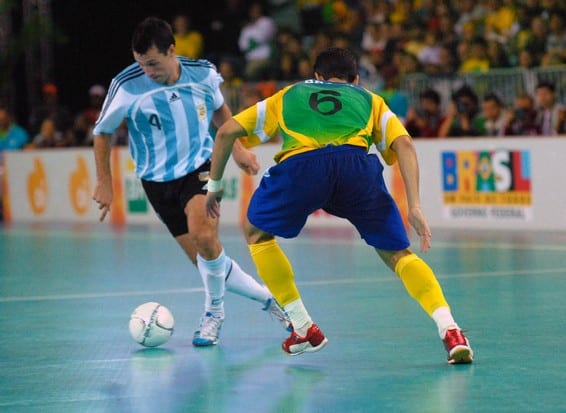We’re here to shed some light on the intriguing question of why this sport, beloved by millions around the world, is called futsal. Futsal, derived from the Portuguese words “futebol de salão,” meaning “indoor soccer,” captures the essence of this fast-paced game that combines the excitement of football and the skills of indoor sports. Through this article, we’ll explore the origins of futsal and uncover the reasons behind its unique and catchy name. So, let’s embark on this journey to unravel the fascinating story behind why it is called futsal.
Origin of the Name
Review contents
Spanish Origin
The name “futsal” has its roots in the Spanish language. The word “fútbol” means football or soccer in Spanish, which is the sport that futsal is derived from. The suffix “-sal” comes from the Spanish word “sala,” meaning room or indoor space. Therefore, futsal can be understood as “indoor football” or “football in a confined space.” This name accurately reflects the nature of the game, with its emphasis on playing in small indoor arenas.
Portuguese Origin
The term “futsal” also has ties to the Portuguese language. In Portugal, the word “futebol” is used for football, similar to its Spanish counterpart. The addition of the suffix “-sal” is consistent with the Spanish origin, highlighting the game’s indoor nature. The Portuguese-speaking countries, such as Brazil, have embraced futsal as well, using the same name to refer to this unique version of football.
Etymology of the Name
Combining Portuguese Words
The name “futsal” can be seen as a combination of two Portuguese words: “futebol” and “sala.” The Portuguese-speaking community played a significant role in the origin and development of futsal, and this etymology reinforces the influence of their language. By merging these words, the sport is labeled as a distinct form of football that takes place indoors.
Similarities to Football (Soccer) Terms
The term “futsal” shares similarities with football or soccer terms, making it easily recognizable to fans of the traditional outdoor game. The inclusion of “fut-” from “futebol” and “-sal” from “sala” ensures a sense of familiarity and association with the popular sport. This allows fans of football to quickly understand that futsal is a variant of the game they already love, albeit with unique rules and a different playing environment.
Evolution of the Name
Early Variations
In the early stages of futsal’s development, various names were used to describe the game. Different regions had their own terms to refer to this fast-paced indoor sport. These names were often tied to the specific language and culture of the respective countries. However, as the game gained popularity and spread internationally, a more standardized name became necessary to ensure consistency and understanding among players and fans worldwide.
Uniformity and Standardization
To achieve uniformity, the name “futsal” gradually emerged as the preferred choice. This consistency in nomenclature helped solidify the identity of the sport and created a shared understanding of its rules and characteristics. By adopting a single name, futsal gained recognition as a distinct discipline within the broader world of football, making it easier for people to identify and differentiate from other forms of the game.
International Adoption
Spread in Spanish-speaking Countries
Futsal’s initial popularity grew in Spanish-speaking countries, where the roots of the game trace back to its conception. These nations, including Spain and various Latin American countries, embraced futsal as a way to further develop their football skills. The Spanish origin of the name “futsal” played a crucial role in the widespread adoption of the sport throughout these countries.
Introduction in Portuguese-speaking Countries
As futsal expanded beyond Spanish-speaking regions, it found a natural affinity in Portuguese-speaking countries. Brazil, in particular, played a significant role in popularizing the sport, both domestically and internationally. The shared language and cultural connections between these nations facilitated the integration of futsal into their sporting landscape, contributing to the growth and recognition of the game.
Global Expansion
Over time, futsal transcended language and cultural barriers, garnering attention and followers from all corners of the globe. The combination of fast-paced action, technical skill, and strategic play appealed to football enthusiasts worldwide. Organizations dedicated to promoting futsal emerged, facilitating its expansion into non-traditional football nations and regions. Today, futsal is played and enjoyed by millions of people worldwide, spanning across continents and cultures.
Official Recognition
Amsterdam Congress
In 1989, a landmark moment for futsal occurred with the organization of the first-ever International Futsal Conference in Amsterdam, Netherlands. This event brought together representatives from various national futsal associations, as well as FIFA officials and experts in the sport. The conference aimed to discuss and establish consistent rules and regulations for futsal, fostering the growth of the game and its formal recognition on an international scale.
FIFA Recognition
Following the Amsterdam Congress, FIFA officially recognized futsal as a distinct and separate discipline from traditional football. This recognition solidified futsal’s position within the football community as an important and valued sport. FIFA organized international futsal tournaments, including the FIFA Futsal World Cup, which further elevated the status and popularity of the game. The sport’s official recognition by FIFA provided a boost to its growth and development worldwide.
Rules and Regulations
Distinctive Characteristics
Futsal has its own set of rules and regulations that distinguish it from traditional football. The most apparent difference is the playing surface, which is typically an indoor court with hard flooring. The size of the pitch is smaller compared to outdoor football, promoting tighter spaces and faster-paced gameplay. Futsal also features a smaller and heavier ball, emphasizing precise ball control and technical skill. The game prioritizes skillful footwork, quick decision-making, and close ball control due to these unique characteristics.
Comparison to Other Indoor Football Forms
While futsal stands out as the most widely recognized indoor football form, it is not the only variation of the game played indoors. Other versions, such as indoor soccer and indoor football, have their own rules and variations. Futsal, however, distinguishes itself through its specific regulations and regulations sanctioned by FIFA. The sport’s official recognition and standardized rules set it apart from other indoor football forms, ensuring consistency and fairness in competitions and tournaments.
Popularity and Growth
Recreational and Professional Levels
Futsal has gained popularity at both recreational and professional levels. At the recreational level, futsal provides an exciting and accessible way for football enthusiasts to stay active and enjoy the sport. It is often played in community centers, schools, and indoor sports facilities, attracting players of all ages and skill levels. At the professional level, futsal has elite leagues and competitions, showcasing the incredible technical abilities and tactical prowess of top players.
Youth Development Programs
Many football associations and clubs recognize the role of futsal in developing young players’ skill sets. Futsal’s emphasis on close ball control, quick decision-making, and tight spaces helps improve players’ technique, creativity, and spatial awareness. Youth development programs often incorporate futsal training alongside traditional football, as it complements and enhances players’ overall football abilities. The popularity of youth futsal programs further contributes to the growth and recognition of the sport.
Tournaments and Championships
Futsal has its own dedicated tournaments and championships, where teams compete at regional, national, and international levels. The FIFA Futsal World Cup, held every four years, showcases the best national teams from around the globe. Additionally, continental championships, such as the UEFA Futsal Championship and the Copa America de Futsal, provide platforms for teams to compete for regional supremacy. These tournaments not only attract a large audience but also generate excitement and inspire the next generation of futsal players.
Futsal vs. Traditional Football
Differences in Playing Style
The distinct characteristics of futsal lead to differences in playing style compared to traditional football. The smaller pitch and reduced number of players encourage faster ball circulation and more intricate passing combinations. Players must also utilize close ball control and quick footwork to maneuver in tight spaces and evade opponents. Futsal places greater emphasis on technical skill, agility, and creativity, fostering a dynamic and exciting style of play that sets it apart from outdoor football.
Tactical Adaptations
The playing conditions and unique rules in futsal necessitate tactical adaptations by teams and players. The smaller pitch encourages a more pressing style of play, with teams often applying intense defensive pressure to win possession quickly. Tactical setups often prioritize maintaining a compact shape and effective teamwork to exploit gaps in the opponent’s defense. Futsal’s tactical nuances challenge teams to adapt their strategies and utilize innovative approaches to achieve success.
Physical and Technical Demands
Futsal requires a combination of physical and technical abilities from its players. The fast-paced nature of the game demands high levels of speed, agility, and endurance. With limited space available, players must possess exceptional ball control and passing accuracy to maintain possession and create goal-scoring opportunities. The physical and technical demands of futsal create a unique playing experience that enhances players’ overall football skills and athleticism.
Futsal as a Fast-paced Sport
Exciting Gameplay
The nature of futsal, with its smaller court, fewer players, and technical emphasis, results in fast-paced and highly entertaining matches. The compact playing area forces teams to constantly engage in quick exchanges, creating a rapid back-and-forth rhythm. The frequent transitions from defense to attack and vice versa make for an incredibly dynamic and captivating spectacle. Futsal’s exciting gameplay ensures spectators are always on the edge of their seats, eagerly anticipating the next skillful move or brilliant goal.
Skills Development
Futsal’s unique characteristics contribute to the development of various skills essential in football. The confined space challenges players to make split-second decisions, improving their awareness and decision-making abilities. Technical proficiency, such as close ball control, precise passing, and quick changes of direction, are all honed through intensive futsal gameplay. The game’s emphasis on one-touch play and individual creativity helps players enhance their overall footwork and technique, making them more well-rounded footballers.
Improving Football Performance
Participating in futsal can have a positive impact on a player’s performance in traditional outdoor football. The improved ball control, agility, and decision-making skills developed through futsal training often translate to enhanced performance on the larger field. Futsal’s fast-paced nature forces players to make split-second decisions and react quickly, which can greatly benefit their ability to adapt and thrive in outdoor football matches. Many professional footballers credit their time in futsal as a crucial factor in their development and success.
Future Prospects
Continued Global Expansion
The popularity of futsal shows no signs of slowing down. As more countries and regions embrace the sport, its global footprint continues to expand. The establishment of futsal leagues, the organization of international tournaments, and the increasing recognition and support from football associations contribute to the continued growth and development of the game. Futsal’s accessibility, exciting gameplay, and ability to enhance football skills make it an attractive option for both players and fans.
Potential Olympic Inclusion
Futsal’s widespread popularity and unique qualities have led to discussions regarding its potential inclusion in the Olympic Games. The sport’s dynamic and visually appealing style of play aligns with the Olympic values of athleticism, skill, and fair competition. With its own dedicated international tournaments and a growing presence worldwide, futsal has emerged as a strong candidate for future Olympic inclusion. This potential milestone would further elevate the sport’s status and increase its global following.





































